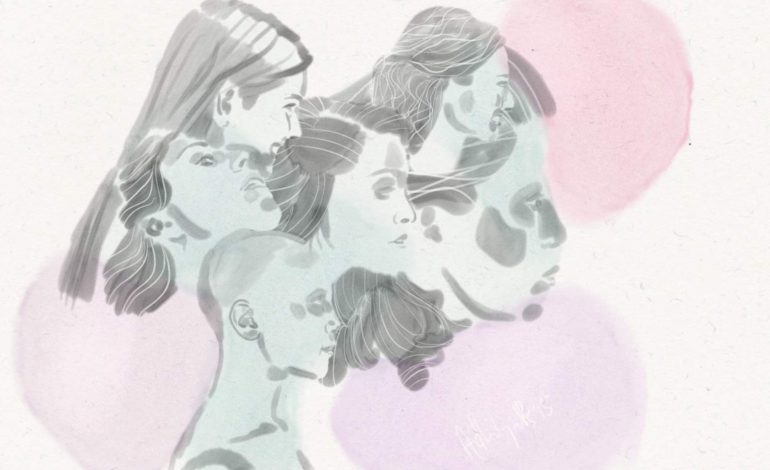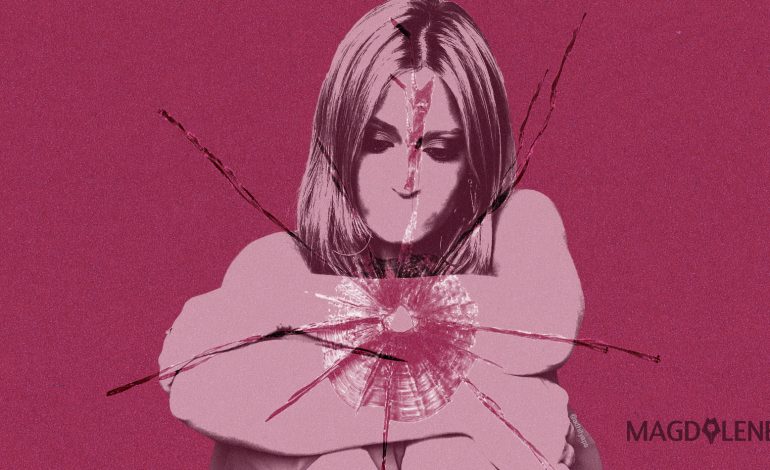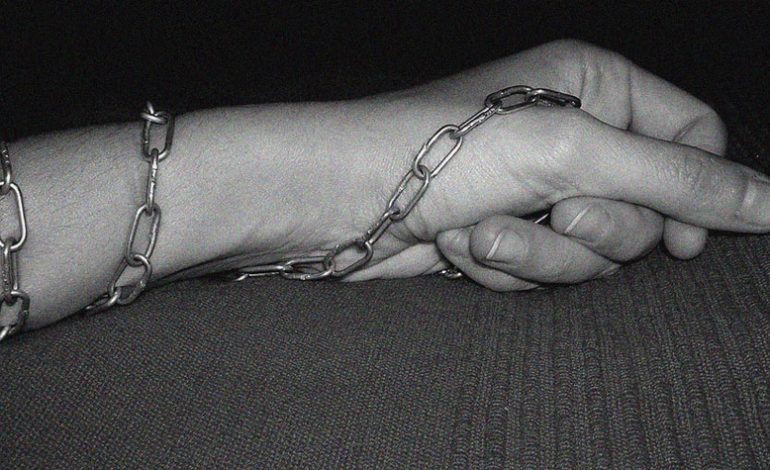The Empowerment of Hurts: A Perspective on Indonesian Women

Every Tuesday and Thursday I have what I like to refer to as my “Ibu Sexy Dance Time.” A dance aerobics class of about 20 women, we meet in a small tin-roofed studio a 20-minute bike ride away from my house.
The dance styles in this class range from full on striptease to Broadway kick-ball changes. It’s a hilarious but legitimate workout. The instructor’s choreography involves a lot of karate kicking our way into sultry split poses, hula hoop sized hip thrusts, and staring at our reflections with pouty seriousness. Sometimes we do all of this while manually moving our breasts up and down like light switches. I’m not sure how that last bit figures into overall calories burned but it makes me laugh, which I guess engages my abs?
The best part about this class is that it immerses me in the experience of being female. It might not come as a newsflash to friends and family back home, but, yes, Indonesia, I am indeed a woman. My strangeness as a foreigner makes me sexless. On the other side of my asexual existence is the acutely felt presence of my lady chromosomes.
Indonesia continues to exist and function under cultural patriarchy, a system in which women essentially operate under separate social norms from men. On a day-to-day basis, I am often ashamed of the attention my body receives. I am required to serve men tea, and then sit separate from them. I must not touch them with my fingertips nor tempt them with my bare shoulders. I am all too aware of being alone with a man and the subtle peril it implies.
Dance class is a safe zone from all that. My internal USA clock means I always arrive at the studio ten minutes early and am able to chat with the ladies as they come in. Walking into class they all look the same in their long conservative clothing and tightly pinned hijabs, but once they are inside, it is topsy-turvy chaos: hijabs are whipped off and clothes are shed until the women around me stand in nothing but brightly colored spandex booty shorts and itty-bitty bikini tops.
The air inside the studio is like wet wool, and it feels very much like dancing in someone’s armpit. In this extreme heat, leaving little to the imagination is the smartest way to dress for Ibu Sexy Dance Time, and, I must say, these ladies love to bare all.
Their bodies are beautiful but not in the perfectly toned lululemon-esque way we think the woman on the treadmill next to us at the gym is beautiful. On the bodies I dance next to are the etchings of a hard life lived: one woman’s lower back is pulled tight with puckered burn marks from oil spilled years ago, another’s jaw is partially caved in from being kicked by a young bull.
The woman next to me grasps her ample belly flesh and shows me where an operation went wrong. These women revel in showing me their scars. What shines through these wounds is the open love these women have for the bodies they inhabit. It’s lovely to watch them watch themselves in the full-length mirrors. You can tell they are lapping up their reflections–imperfections, wounds and all.
Indonesian women accept that the very launching point of female empowerment is in what is weak and in what is wounded. Their power lies within their pain.
I have been hesitant to write about this subject not because I don’t think gender equality is important, but because I am worried that by complaining about these puffed up men and their social patriarchy, I will be viewed as “just another” hurt woman saying the same things women all over the world have already said.
The moment we start talking about feeling wounded as a woman, we risk transforming our suffering from an aspect of the female experience into an element of the female constitution. I’d like to change the tone of that conversation.
It is a great illusion in our Western culture that what we confess to is who we are. Upon arriving in Indonesia last year I was worried that by acknowledging the fear and shame my gender generated from the conservative culture around me, I would be seen as weak and docile. I’m not proud to say that these less than flattering qualities were what I expected in the women I would meet, live and work with on Java. It has been quite the opposite. I have had the privilege of knowing (and dancing with) some incredibly strong and empowered Indonesian women in my community throughout the course of my service.
The source of that empowerment is what differentiates my Western feminism from Indonesian feminism. We American women refuse to see ourselves as anything less than strong and fearless. “Flinty or Die” would be an appropriate slogan I think, if we were ever to slap a bumper sticker on the American female empowerment agenda. We must be tough, or risk losing the power and respect we have fought so hard for.
Alternately, Indonesian women accept that the very launching point of female empowerment is in what is weak and in what is wounded. Their power lies within their pain. They seem to understand that the very act of becoming empowered first requires one to have no power at all.
Empowerment. A buzzword for our American generation if there ever was one. Everything from building schools in developing countries to emailing pictures of your boobs to strangers is decidedly “a pretty powerful thing to do as a woman.”
It calls to mind a headline I once read in The Onion: “Women Now Empowered by Everything a Woman Does.” The word’s ubiquity suggests how much women want power but how conflicted we are about getting it. Deciding you look great without makeup on is empowerment. Knocking back tequila shots at the bar is empowerment. Having a one-night stand and refusing to hurt about it is empowerment. Saying “I love you” first is empowerment. It is all encompassing and all around confusing. American girl power is betwixt and between.
There is a TV show called Girls about girls who hurt but constantly disclaim their hurting. They fight about rent and boys and betrayal, stolen yogurt and the ways self-pity structures their lives. I remember in one scene they fight: “You’re a big, ugly wound!” And so the other volleys back “No, you’re the wound!” How very American I see now: to call each other out on being weak, raw and melodramatic. This show would never fly in Indonesian culture. Aside from all the promiscuous sex and swearing, the Indonesian women I know would never accuse another woman of feeling something a little too deeply.
This is not to say that Indonesian feminism has it all figured out. The saving face aspect of Javanese culture commands stoicism at all times, and it seems that there are only certain outlets acceptable for these bursts of estrogenic emotion. Sad karaoke songs, for instance. Soap operas, tragic emojis and sexy aerobics classes.
It isn’t uncommon for a woman to weep her way through a Celine Dion song, but remain stoney faced at the funeral of a close family member. From my American perspective these platforms of pain often appear too basic, and almost cartoonish when compared to the ways I have experienced female pain and power. Like children I’ve babysat who tell me they are in love, female empowerment in Indonesia at times comes across to me as underdeveloped and immature.
An empowering admission of weakness
Usually 40 minutes into aerobics class a remixed version of Leona Lewis’ “Bleeding Love” moans around us as we do squat pulses.
“You cut me open and I / Keep bleeding, keep, keep bleeding love/ I keep bleeding, I keep, keep bleeding love.”
The lyrics could be lamenting pain or affirming it. Either way, we aerobics ladies find it energizing, pulsating deeper into the beat. In the states I found this song to be dramatic and trite, the lyrics coagulated with sentimentality. My Indonesian ladies don’t see it that way at all.
“Isn’t her voice beautiful?” one woman tells me when I mention the song, “so much sadness and feeling.”
For these women, the song is pure truth, whereas for me, the lyrics are mere bathos; transforming actual feelings into the funny and the ridiculous, a song to wail comically into a hairbrush. But why does my inner American feminist refuse to love this kind of simplistically expressed hurt? Why can’t I accept that there is beauty that dwells in the hurting itself?
I worry that we think our fight for equality is old news, and to dig up old arguments implies we are hurting and in hurting we are embodying the weakest, most loathsome parts of our sex that we are so hell-bent on disproving.
We wear the evidence of our neglect and hurt on our bodies at once like armor and a scrawled “kick me” sign. I look at the Indonesian women who dance around me, and they are very aware of the stories their scars reveal, as if the wound itself marks the threshold between interior and exterior; a physical flagging of the things that can only be felt.
Case in point: the scabbed mottling on one woman’s face after she tried to bleach her skin whiter. Why did she do this? I overhear her talking about a man at work, who made fun of her dark skin. We hurt and yet we dance. The Indonesian women in this class seem to understand that hurting now doesn’t mean we will hurt forever – or that hurt is the only destiny we can own. Case in point: the way this semi-bleached woman is always ogling her cute lil’ tushy during our twerking interludes.
There is a way of representing female empowerment that can witness victimization but also witness a larger self around that victim – a self who grows larger than its scars without disowning them, who is neither wound-dwelling nor jaded, who is actually healing. We have the capacity to redraw the lines between our powerlessness and our power. The women I dance with have shown me that suffering is interesting but so is getting better.
I worry that American women (myself included) think they no longer have the right to scars and flaws and pain the way Indonesian women do. I worry that we think our fight for equality is old news, and to dig up old arguments implies we are hurting and in hurting we are embodying the weakest, most loathsome parts of our sex that we are so hell-bent on disproving.
We are thoroughly obsessed with not being the victim, so we play the fun and fearless female card instead: cutting our hair, sexting an ex and laughing at the woman who sings Adele’s “Someone Like You” tearfully and unironically. I know the hurting woman is a cliche but I also know lots of women in Indonesia and at home who still hurt. Sometimes the wounded woman is a stereotype, but sometimes she’s just true.
Why can’t we allow ourselves these admissions of weakness? Why can’t we let ourselves be afraid? Indonesian women tell me all the time that they are afraid. Afraid of traveling alone, afraid of leaving and getting left by loved ones. These worries are not simple shadowy incantations of what patriarchy has pounded into their psyche, but real, human fears. Indonesian women have taught me not to be afraid of being broken, something I think American women would never admit to being afraid of in the first place.
Yet there is a certain kind of brokenness that cannot be fixed with burning bras, raw juice cleanses and nights spent in with girlfriends raucously validating the shit out of each other. Women are broken and wounded all over the world. But maybe women within this patriarchal culture are better at extracting power from what hurts, because they must use their strength more directly against the maelstrom of accusations telling them their worth is less.
They are not afraid of the painful journey to empowerment because they are not afraid of inhabiting that pain. No matter how overly performed and naive those channels may seem to me (I’m looking at you Indonesian soap dramas, and your drawn out deaths and monologues of misery), they do as the adage goes “get them where they’re going.”
We Westerners like the quick fix, the ripping off of a band-aid to avoid too long a sting. The empowered women of my generation often seem to be afraid of too much feeling and thus have insulated themselves against this kind of broken-trauma through casual sex, topless selfies and anger-driven self-defense classes. We believe we no longer have the right to hurt, as if in hurting we are doing a disservice to the “fuck yeah” backbone of the feminist movement.
Unlike our Indonesian female counterparts, we Western women want to feel empowered without acknowledging that sometimes that power is begotten by pain. American women like to think they are powerful in spite of their hurt, while the Indonesian women I have met believe they are powerful because they hurt. The notion that women who are not molded and empowered in the Western sense of the word are struggling and helpless must be banished.
These fierce Indonesian women I have come to know and love are not struggling victims in need of total Western rescue. It all turns on the ownership of that hurt, and these women own it and refuse to be beaten by it. Go to any karaoke bar: they are women, hear them wail.
Being a female Peace Corps volunteer on Java has taught me to embrace my gender not only for what makes it strong, but also for what makes it weak. The feminism that stems from vulnerability is just as powerful as the feminism that stems from strength. You can be broken and fearless at the same time. That knowledge in itself is empowering. Whether you feel like laughing or crying, go ahead and bust a move.
Emily Werner is a Peace Corps volunteer on Java. When she isn’t sweating in her desa, she enjoys eating tempeh, speaking elementary Bahasa to anyone who will listen and thinking about life’s questions big and small.






















